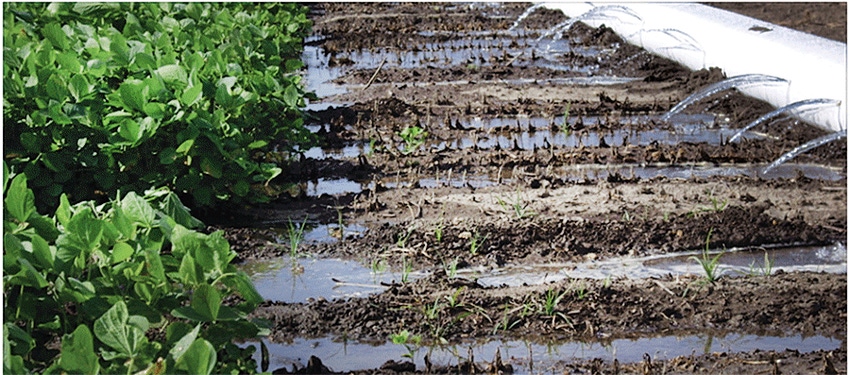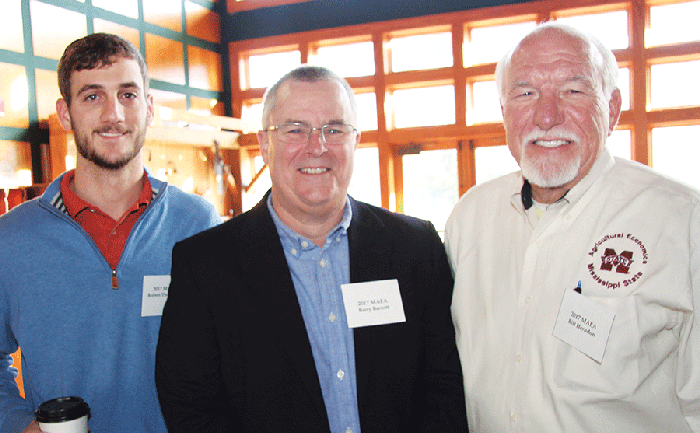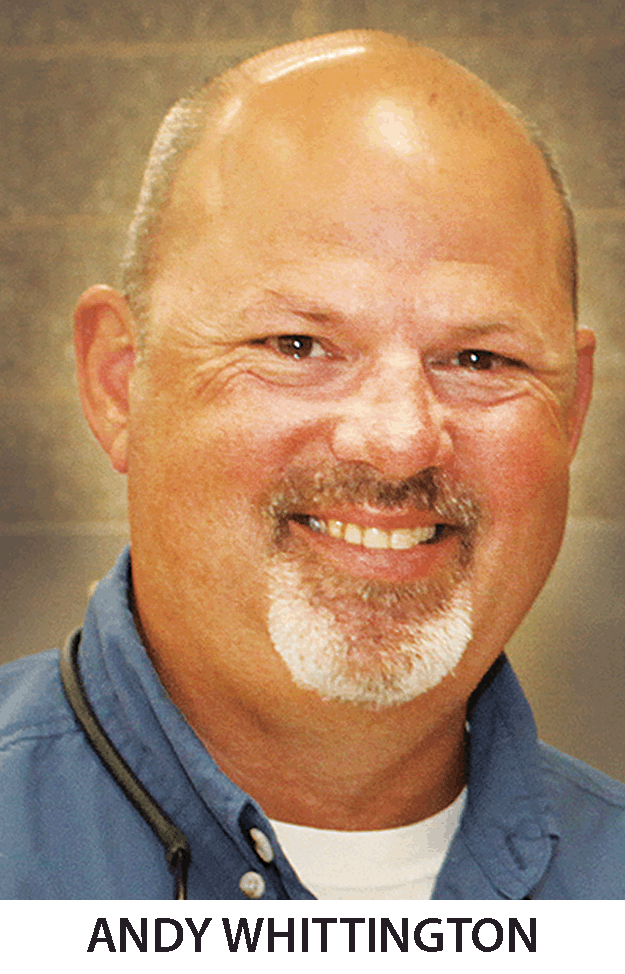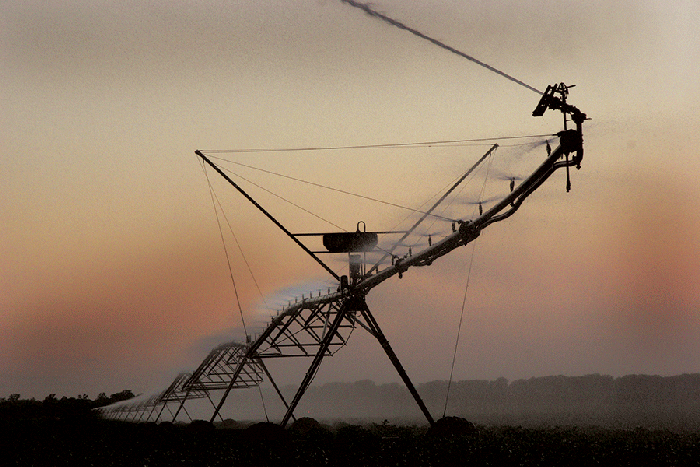
Showing producers firsthand that research aimed at using less water from the Delta alluvial aquifer is sound — and can save money and reduce pollution — has “helped change hearts and minds,” says Andy Whittington, environmental coordinator for the Mississippi Farm Bureau Federation at Jackson.
The transition was not without some skepticism on the part of producers, he said at the annual meeting of the Mississippi Agricultural Economics Association, focusing on water resource management in the Delta.
Dr. Bill Herndon, right, retired vice president of Mississippi State University Extension; Dr. Barry Barnett, center, MSU professor of agricultural economics; and Robert Thompson, MSU agricultural economics graduate student from Windsor, N.C., were among those attending the annual meeting of the Mississippi Agricultural Economics Association.
“Six years ago, when Mississippi State University researchers and various organizations in the state started being really proactive, looking at what would happen 25 years or 50 years down the road if we maintained the status quo on water use for agriculture, the challenge was to find ways to get the attention of producers who are more concerned with ‘what am I going to do next year, or two years from now?’ Getting them to realize that they needed to start thinking about their water use now, because 25 years from now they might have a problem, took some convincing.”
Getting the conversation moving, Whittington says, was a closer look at the irrigation well permitting system in the Delta and a challenge issued by Dr. Jason Krutz, then MSU irrigation specialist at the Delta Research and Extension Center at Stoneville, now director of the Mississippi Water Resources Research Institute, also at Stoneville.
“When Dr. Krutz was speaking to a roomful of producers,” Whittington laughingly recalls, “I’d sit on the back row, closest to the door, so I could make a quick exit if things got testy. Jason would look producers in the eye and flat out tell them: ‘You take 40 acres, and you give me 40 acres, and I’ll use my system and I’ll beat you every time. I’ll use less water and I’ll make a better crop.’ That sometimes didn’t go over so well.
“But he was right. And when a producer would take him up on his challenge, he’d prove to them that they could save water and money, with equal or better yields than with what they’d been doing. We thought we were doing as well as we possibly could do with our water management, but research has shown us we can do better. That has been a tremendous change in the hearts and minds of producers.
“Getting producers to talk to other producers about what they’ve done will work a lot faster than somebody going into a room and telling them they’ve got to do something differently,” Whittington says. “They’ll challenge you, and you’ve got to be able to prove them wrong. And the research was able to do that.”
Producers have adopted many of the water management measures, he says, “and it has happened at a much more rapid rate than we thought possible. The Pipe Planner program, for example, has been tremendously well-accepted — not because Jason told them that’s what they needed to do, but because a few producers accepted his challenge, he showed them it would work to their benefit, and those producers went to the coffee shops and told other producers that it worked, that they had saved water and money.”
Another program, PHAUCET, has been widely adopted. “Not long ago,” Whittington says, “a producer told me ‘It’s amazing how much money I’ve saved on polypipe alone, just by using PHAUCET’ — not to mention what he saved on water and pumping costs. This has been an eye-opener for a lot of people: good, solid university research that a producer can apply on the ground and save money. I think we’ve had really good buy-in.”
Producers have adopted many water management measures, says Andy Whittington, “and it has happened at a much more rapid rate than we thought possible."
A voluntary metering program for irrigation wells in the Delta also “took some convincing,” Whittington says. “It wasn’t easy to ask producers to agree to meter their water usage, so we could generate meaningful data on pumping from the aquifer. We felt a cooperative, voluntary effort was much better than a mandatory program with producers being told, ‘you’ve got to do this’, and it has worked very well so far.
“Some great data sets have been obtained that USGS is using to better model the aquifer, and then that model can be used to determine other practices we can use to hopefully move the water use curve even farther downward.”
“A tremendous amount of effort and expertise are being directed toward water resource management in Mississippi and the U.S., and I think we in Mississippi are uniquely positioned to be a part of this movement.” — Dr. Bill Herndon
The goal, Whittington says, “is that the individual producer will be able to take the reports and say, ‘Here’s how much water I used on each of my fields, here are the yields I got, and maybe it then opens his eyes to ways to do things differently. At the end of the day, we’re trying to show producers how they can use irrigation management practices to reduce the amount of water they use wherever they can.”
The metering process “takes some reminding,” he says. “The reporting deadline for this year is Feb. 1, 2018, and we’ll spend much of our holiday time reminding producers that they need to go out, read their meters, and report their data. Now would be a great time to do that, before the holiday season.”
In addition to irrigation management practices, Whittington says, “I’m a huge fan of weirs. They’re relatively cheap, they can help ease stress on the aquifer, and they settle out sediment and nutrients. I’m also a fan of tailwater recovery systems, which aren’t cheap — but they provide a co-benefit of water quality. Both of these have downstream benefits for such issues as hypoxia in the Gulf from nutrient runoff.
“USGS has a program in which they’re basically mapping the entire alluvial plain, looking at soils and where are the best places to build weirs to get aquifer recharge, get some producers off of groundwater permits and put them on surface water permits, and improve the entire system. I think the research is going to show there are a lot of co-benefits to be obtained from a lot of practices like these.”
There is, Whittington says, “a great working relationship” the Mississippi Department of Environmental Quality, the Mississippi Water Task Force, the Mississippi Water Research Institute, USGS, and other state and federal agencies, in the goal to help preserve water resources for future generations.
Dr. Bill Herndon, who retired earlier this year as Mississippi State University Extension vice president, said, “A tremendous amount of effort and expertise are being directed toward water resource management in Mississippi and the U.S., and I think we in Mississippi are uniquely positioned to be a part of this movement.”
In addition to the newly-funded Delta Water Center (temporary name) and the Mississippi Water Resources Research Institute, both at Stoneville, Miss., he says, the National Water Center at the University of Alabama, Tuscaloosa, has more than 200 scientists focusing on water issues.
About the Author(s)
You May Also Like




